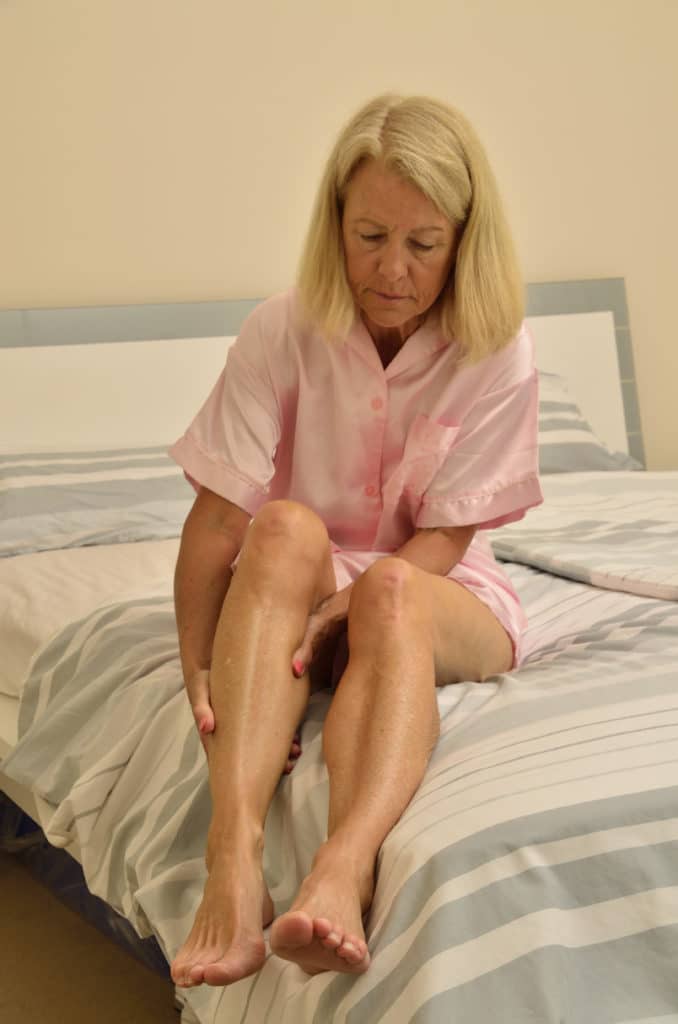
Why Do Varicose Veins Hurt Most at Night?
If you think that your varicose veins hurt more at night, you are probably not imagining this. The reason why, in a word, is contrast. This might make more sense once it is explained...
Especially since the advent of electrical lights, it can be easy to forget that nighttime is for rest. As daylight wanes, everything in nature gets quieter and darker and cooler. Only we humans maintain our bustling pace right up until the point where we drop into bed. (Then we twiddle our thumbs while we wait for sleep to come. Or we wake at odd hours, minds already racing).
Even on the cellular level, our bodies are winding down as the evening progresses, preparing for a quiet restorative time.
Symptoms of Varicose Veins Increase During Day
Throughout the course of the day, though, varicose vein pain and discomfort tends to get amped up. Gravity pulls blood against compromised valves and leads it to pool in the lower legs. Agents of inflammation also get concentrated at these sites, and the nerve receptors that register pain start to fire more furiously. This can be tolerable—as long as our brains are busy and distracted from the leg pain.
So really...why do varicose veins hurt most at night?
When our bodies are trying to rest, especially against the backdrop of the dark and the quiet, every sensation seems magnified: bumps, sounds, lights—and these throbbing aches and pains.
Varicose veins and leg pain plus leg cramps can make it difficult to get restful sleep. It can take hours for that discomfort to ease off as lymph and other metabolic substances are taken back up into circulation. And if you happen to point your toes as you stretch out in your sleep, you might be awakened by the startling discomfort of a muscle cramp. Often by the time equilibrium is restored, it is time to get up and start the whole process again.
There Are Things You Can Do To Ease Nighttime Varicose Vein Pain:
- First of all, if varicose vein pain is keeping you up at night, or if you are experiencing any of the other symptoms of chronic venous insufficiency, it is time to have your vascular health checked by a qualified vein specialist.
- Ease into the evening. Put your legs up for a bit, especially at the end of the day, and give your veins a chance to calm down before you go to bed. Perform a little local self-massage to encourage circulation and take some pressure off your veins.
- Perform some gentle exercise. Walking, yoga and other gentle forms of exercise are great for relaxing the entire body and promoting healthy respiration and circulation of blood and lymph.
- Ensure proper hydration. Drinking adequate water is key for promoting healthy circulation, keeping blood vessels and tissues healthy and pliable, and for preventing muscle cramps.
- Eat a healthy diet, full of vitamins, minerals and macronutrients. There is not enough space here to say all that needs to be said about the importance of taking care of your body through the food you eat. However, there are lots of great nutrition resources out there.
- Stretch out those muscles. Tight and constricted muscles prevent the healthy circulation of blood and lymphatic fluid through the legs. And tight muscles are more likely to ache and to cramp up.
Of course, a qualified vein doctor will have more suggestions for easing and eliminating the discomfort of your enlarged veins. Using the results from a detailed examination and duplex ultrasound, they can tailor treatment options for you, and have you sleeping comfortably through the night in very little time.
Congratulations, you are pregnant! Your bundle or bundles of joy are on the way to change your life forever! The body changes quickly during pregnancy, and some of these changes are not so wonderful! Varicose veins are a common occurrence in pregnancy. There are a number of reasons for this: blood volume increases, hormones shift,…
Read More- « Previous
- 1
- …
- 13
- 14
- 15

